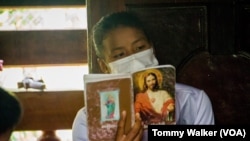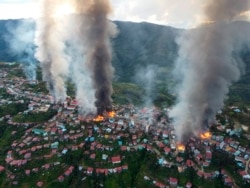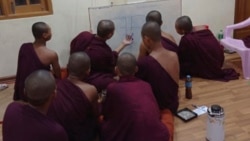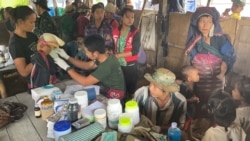Myanmar’s military is cracking down on religious groups that refuse to accept military rule, religious leaders say.
Nearly 88% of Myanmar’s population identify themselves as Buddhist, with other religious denominations, such as Christians, Muslims, and Hindus, making up the rest. Seemingly all of the country’s religious groups are being caught up in the fallout from the military coup.
In the nine months since the military-run State Administrative Council ousted the democratically elected government, fighting has continued between military forces and anti-coup opposition.
A military offensive aimed at targeting an ethnic armed group in Chin state in western Myanmar killed civilians and destroyed religious buildings at the end of October, according to local sources. More than 90% of Chin state’s population is Christian, according to the Chin Human Rights Organization.
Military spokesman Zaw Min Tun denied to local reporters that buildings were specifically targeted.
The Burma Human Rights Network, a local group, condemned the attacks in a statement Monday, saying the junta has a long history of targeting religious minorities.
Buddhist monks, Muslims, and Christians have all taken to the streets and demonstrated against the military takeover. Religious figures in the country say military action has had a chilling effect on religious groups.
Sister Francisca, formerly a nun at a Catholic church in Mandalay, described how soldiers ordered her church not to participate in anti-coup protests.
"The military went and told the cardinal and leaders, don't get involved in the revolution,” she said.
She added that soldiers had refused to allow her community to carry out daily charitable tasks, including treating COVID-19 patients. She recounted to VOA this week how armed soldiers had threatened to shoot her and others sitting in front of her house unless they went inside.
She also described an incident in which she said a neighborhood man was shot by soldiers.
At night, she said, local people do guard duty but, she said, soldiers shoot the guards one of them was shot in the lung.
“Fortunately, he survived. We stay afraid all the time,” she said.
She ultimately fled to another city. Although she found another Christian church there, it was already occupied by soldiers and she remains on the run.
Thet Swe Win, founder of Synergy, an organization promoting interfaith
efforts in Myanmar, told VOA by phone that several religious groups have been targeted by the military, including Buddhists. Unlike other religions,
though only the Buddhists who oppose the coup face military pressure. He estimates around 80% of Myanmar's Buddhists oppose the junta.
He said the military has branded monks who refuse to accept junta rule as “fake” before beating and arresting them.
He believes the crackdown on these monks is not about religion, but about influence.
“I’m not sure it’s religious persecution because all the monks who were arrested were involved in the strike. They raided monasteries to arrest monks. I don’t hear they destroy monasteries of the pagodas,” he said.
Myanmar has a long history of religious and ethnic conflict, and Thet Swe Win said he is concerned about nationalism among some Buddhist monks. Neither pro- nor anti-coup monks accept religious minorities such as Rohingya Muslims, he said, and he accused the military of using these differences to stoke tensions.
Sann Aung, a university teacher and imam of a mosque in Myanmar, said the junta is “fueling religious conflict to divert political attention.” In addition, he said, Muslims face more persecution if they are arrested during a protest.
Some religious and civil society leaders in August formed the Spring Revolution Interfaith to, Sann Aung said “mobilize and coordinate voices from religious leaders, community leaders and groups to come out with single voice and to support movements fighting against military dictatorship.”
Father Domanic, a priest at a Catholic church in Shan state, told VOA that after he organized a peaceful prayer event that opposed the coup, the military arrested him. He later fled.
The priest now believes “no religion can do well” in Myanmar.
“Most of the religious leaders do not dare to go against the coup, that’s why most peoples’, especially the youth, beliefs and attitudes towards religion are diminishing,” the priest told VOA. “There is less trust in religion and they become frustrated. In my view, only humanitarianism can lead the way to peace.”
Dave Eubank, the head of the Thai-based Free Burma Rangers, a humanitarian group that provides medical assistance within Myanmar, said the military is becoming “desperate” and predicted the junta would increase attacks against religious groups.
“The dictatorship of Burma has always targeted Christians and Muslims and religious minorities, which they view not only different from them but also following a god that those minorities feel are higher than any government [and] definitely a threat to the regimes in Burma,” Eubank said, using another name for the country.
“Since the coup, the gloves have come off, the attacks have been more direct and pointed,” he said.



